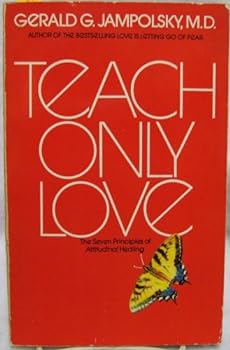Reflections from Tina Thrussell
Actually, life can be more like an open puzzle box dropped on the floor – with pieces scattered everywhere! It can take awhile to put all the pieces together so that you can see the full picture… and sometimes missing pieces show up in the most unexpected ways.
In this case, a missing puzzle piece in my life came from a tiny old paperback book I pulled off our bathroom library shelf one day. Battered and worn, with pages literally falling out of the binding that no longer has any glue to hold them in place, this copy of Dr Gerald G. Jampolsky’s book, “Teach Only Love” doesn’t look like much, but it truly is a treasure!
A single paragraph on page 8 showed my heart what wasn’t working quite so well for me.
You see, I’ve really been focusing a lot on paying attention to my thoughts the last few months. Consciousness teachings remind us to be very aware of our thoughts because we create our reality with those thoughts… both supportive and unsupportive. So, I wanted to be diligent.
It’s a tough row to hoe, as the saying goes.
Two weeks ago I was teaching the last class in a set of mindfulness practices classes. (Mindfulness is defined as being present to the moment in non-judgemental awareness.) I shared with my class that I’d been given the perfect opportunity for self-awareness that day, which had been pretty rough. I felt unsettled and ungrounded all day. At one point I caught myself saying out loud (for the manyth time!) “Oh my gosh, I am so ungrounded!” and the awareness of what I’d been thinking and what I was creating with that thinking hit me like a slap in the face.
The Law of Attraction – which says what you focus on expands in your life – made me say, ‘Well, of course you’re ungrounded! You kept reinforcing that all day long! Stop it! Stop saying you’re ungrounded because you’re perpetuating that!” I told my students about this and they could all see the merit of paying attention to our thinking.
I laugh now because I missed the mark on the non-judgemental part. I was definitely making myself wrong for what I’d been thinking and saying.
Here’s what Dr. Jampolsky had to say in his impactful paragraph:
“The incident made me realize the importance of the thoughts we think. The direction they take actually constitutes our will to live or die. It is important to understand, however, that whenever I speak of a change in thought, I am not calling you to battle. The means whereby we redirect the mind are identical to the nature of the new direction itself. Peacefully we return to peace. Gently we lean into gentleness. If you ever find yourself unwilling to think the kind of thoughts that you believe this book calls for, please do not fight yourself. It is a letting go of tension that is being recommended. If you simply think what it pleases you to think, what rests and comforts you, you will be doing all I suggest. There is no rationale in trying to force a change in your state of mind. Simply take careful notice of what it is that makes you happy to think, and what makes you unhappy, and your mind will make the necessary adjustment itself.”
There aren’t quite words for what I experienced when I read that. It was like a little click inside. “Oh! I’m being conscious and aware of my thoughts, but I’ve been going to battle with myself! I’ve been attempting to force a change of thinking over and over!”
Dr Jampolsky’s suggestion to let go of the tension is a much kinder and compassionate approach. It’s more in alignment with non-judgemental awareness.
After reading that paragraph, I imagined myself on that ungrounded day, noticing how ungrounded I was and how unhappy it made me to think that. I saw very shortly after that a calm, gentle, “Well, you know what to do about that. Sit quietly and ground for a moment.” Likely, I would have gently, peacefully proceeded to do so… and stayed in the grounding process until I truly did feel grounded.
Being kind and compassionate, I note that mindfulness is a lifelong practice. And this simple little tool of noticing, letting go, and paying attention to the thoughts that make me happy and unhappy will generate faster progress in the practices, I suspect.
Are you willing to try out noticing what thoughts make you happy vs unhappy and see if that creates any changes for you without ‘beating yourself up’? If you do, write to me at info@shindao.com to let me know how it goes!

